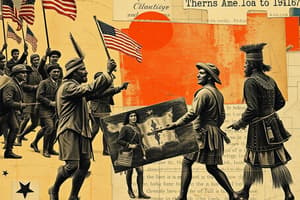Podcast
Questions and Answers
What is a notable sociocultural change that resulted from the Haitian revolution?
What is a notable sociocultural change that resulted from the Haitian revolution?
- The improvement in international relations
- The increase in class conflict
- The continuation of slavery in the nation
- The establishment of a century of racial tensions (correct)
How did the Troubles in Northern Ireland impact daily life beyond the end of violent conflicts?
How did the Troubles in Northern Ireland impact daily life beyond the end of violent conflicts?
- By establishing peaceful coexistence
- By fostering unity among diverse ethnic groups
- By promoting cultural diversity
- By creating deep divisions amongst diverse ethnic groups (correct)
What psychological impact can rebellions have on individuals?
What psychological impact can rebellions have on individuals?
- Inducing feelings of fear and submission in all participants
- Triggering PTSD symptoms only among those indirectly involved
- Affecting only outward behavior without internal changes
- Fostering a sense of empowerment and pride among participants (correct)
What enduring change resulted from the American Civil Rights Movement?
What enduring change resulted from the American Civil Rights Movement?
How do rebellions contribute to societal progress according to the text?
How do rebellions contribute to societal progress according to the text?
Flashcards are hidden until you start studying
Study Notes
Unraveling Rebellion's Influence on Communities and Societies
Throughout history, rebellions have been an unyielding force for change, often challenging established orders and tipping the balance between oppression and freedom. These uprisings can stir profound shifts within societies, leaving indelible marks upon their landscapes—both physical and societal. Let's delve deeper into how these moments of defiance affect communities from various perspectives.
Economic Implications
Rebellions can disrupt trade routes, leading to shortages or price fluctuations for goods across regions. For instance, during England's Glorious Revolution of 1689, coffeehouses were burned down by rebels, which greatly diminished public access to information due to the loss of important newspapers and social hubs where economic news was exchanged. Conversely, successful revolts may usher new socioeconomic systems, such as the agrarian reform enacted after Mexico's Zapatista War, resulting in a more equitable distribution of land among farmers.
Political Impacts
In many scenarios, rebellions lead to political transformations, either through direct takeovers of power or via negotiations with governing bodies. For example, the French Revolution brought about various constitutional changes, including replacing monarchical rule with a republican form of government. Similarly, the Arab Spring protests resulted in regime change throughout North Africa and the Middle East, albeit not without further complications and ongoing developments.
Social Repercussions
The aftermath of a rebellion might bring forth significant sociocultural alterations. One poignant illustration is how the Haitian revolution ended slavery in the nation while also instigating a century of racial tensions, rooted in class conflict stemming from the revolution itself. Another pertinent case is the Troubles in Northern Ireland, which led to deep divisions amongst diverse ethnic groups, dramatically influencing daily life well beyond the end of violent conflicts.
Psychological Effects
Rebellions do not only impact communities outwardly; they also resonate deeply within individuals, shaping perceptions and behavior patterns. Responses could vary widely, ranging from trauma-induced PTSD symptoms, especially amongst those directly involved in the events, to feelings of empowerment and pride among participants who believe their actions facilitated positive change. Moreover, rebellious acts are often echoes of broader cultural narratives, and studying them offers valuable insights into the psyche of certain societies over time.
Examples of Enduring Change
For all its complexity, it is essential to appreciate that rebellions aren't mere historical footnotes. They frequently result in lasting alterations, some of which we still observe today. To name just two examples, women's suffrage movements across Europe helped grant millions of female voters worldwide, ultimately paving the way towards gender equality, and the American Civil Rights Movement produced far-reaching legislation aimed at combatting discrimination based on race, creed, color, and national origin, thus improving lives for countless citizens.
To sum up, understanding the dynamics and consequences of rebellions provides crucial insight into human nature under duress. By examining past instances of upheaval, scholars and laypeople alike gain perspective on the potential for progress — both hopeful and disheartening — inherent in society's capacity for collective action.
Studying That Suits You
Use AI to generate personalized quizzes and flashcards to suit your learning preferences.



